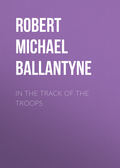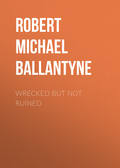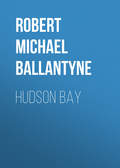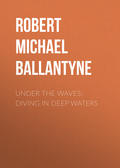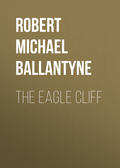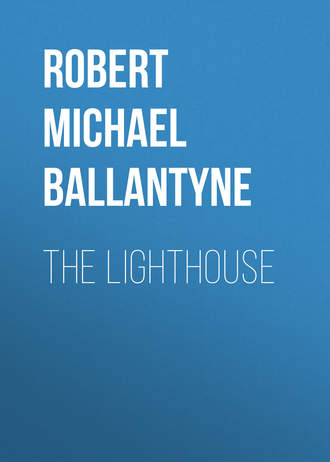
Robert Michael Ballantyne
The Lighthouse
Chapter Twenty Five
The Bell Rock in a Fog—Narrow Escape of the Smeaton
Change of scene is necessary to the healthful working of the human mind; at least, so it is said. Acting upon the assumption that the saying is true, we will do our best in this chapter for the human minds that condescend to peruse these pages, by leaping over a space of time, and by changing at least the character of the scene, if not the locality.
We present the Bell Rock under a new aspect, that of a dense fog and a dead calm.
This is by no means an unusual aspect of things at the Bell Rock, but as we have hitherto dwelt chiefly on storms it may be regarded as new to the reader.
It was a June morning. There had been few breezes and no storms for some weeks past, so that the usual swell of the ocean had gone down, and there were actually no breakers on the rock at low water, and no ruffling of the surface at all at high tide. The tide had, about two hours before, overflowed the rock and driven the men into the beacon house, where, having breakfasted, they were at the time enjoying themselves with pipes and small talk.
The lighthouse had grown considerably by this time. Its unfinished top was more than eighty feet above the foundation; but the fog was so dense that only the lower part of the column could be seen from the beacon, the summit being lost, as it were, in the clouds.
Nevertheless that summit, high though it was, did not yet project beyond the reach of the sea. A proof of this had been given in a very striking manner, some weeks before the period about which we now write, to our friend George Forsyth.
George was a studious man, and fond of reading the Bible critically. He was proof against laughter and ridicule, and was wont sometimes to urge the men into discussions. One of his favourite arguments was somewhat as follows—
“Boys,” he was wont to say, “you laugh at me for readin’ the Bible carefully. You would not laugh at a schoolboy for reading his books carefully, would you? Yet the learnin’ of the way of salvation is of far more consequence to me than book learnin’ is to a schoolboy. An astronomer is never laughed at for readin’ his books o’ geometry an’ suchlike day an’ night—even to the injury of his health—but what is an astronomer’s business to him compared with the concerns of my soul to me? Ministers tell me there are certain things I must know and believe if I would be saved—such as the death and resurrection of our Saviour Jesus Christ; and they also point out that the Bible speaks of certain Christians, who did well in refusin’ to receive the Gospel at the hands of the apostles, without first enquirin’ into these things, to see if they were true. Now, lads, if these things that so many millions believe in, and that you all profess to believe in, are lies, then you may well laugh at me for enquirin’ into them; but if they be true, why, I think the devils themselves must be laughing at you for not enquirin’ into them!”
Of course, Forsyth found among such a number of intelligent men, some who could argue with him, as well as some who could laugh at him. He also found one or two who sympathised openly, while there were a few who agreed in their hearts, although they did not speak.
Well, it was this tendency to study on the part of Forsyth, that led him to cross the wooden bridge between the beacon and the lighthouse during his leisure hours, and sit reading at the top of the spiral stair, near one of the windows of the lowest room.
Forsyth was sitting at his usual window one afternoon at the end of a storm. It was a comfortless place, for neither sashes nor glass had at that time been put in, and the wind howled up and down the shaft dreadfully. The man was robust, however, and did not mind that.
The height of the building was at that time fully eighty feet. While he was reading there a tremendous breaker struck the lighthouse with such force that it trembled distinctly. Forsyth started up, for he had never felt this before, and fancied the structure was about to fall. For a moment or two he remained paralysed, for he heard the most terrible and inexplicable sounds going on overhead. In fact, the wave that shook the building had sent a huge volume of spray right over the top, part of which fell into the lighthouse, and what poor Forsyth heard was about a ton of water coming down through storey after storey, carrying lime, mortar, buckets, trowels, and a host of other things, violently along with it.
To plunge down the spiral stair, almost headforemost, was the work of a few seconds. Forsyth accompanied the descent with a yell of terror, which reached the ears of his comrades in the beacon, and brought them to the door, just in time to see their comrade’s long legs carry him across the bridge in two bounds. Almost at the same instant the water and rubbish burst out of the doorway of the lighthouse, and flooded the bridge.
But let us return from this digression, or rather, this series of digressions, to the point where we branched off: the aspect of the beacon in the fog, and the calm of that still morning in June.
Some of the men inside were playing draughts, others were finishing their breakfast; one was playing “Auld Lang Syne”, with many extempore flourishes and trills, on a flute, which was very much out of tune. A few were smoking, of course (where exists the band of Britons who can get on without that!) and several were sitting astride on the cross-beams below, bobbing—not exactly for whales, but for any monster of the deep that chose to turn up.
The men fishing, and the beacon itself, loomed large and mysterious in the half-luminous fog. Perhaps this was the reason that the sea-gulls flew so near them, and gave forth an occasional and very melancholy cry, as if of complaint at the changed appearance of things.
“There’s naethin’ to be got the day,” said John Watt, rather peevishly, as he pulled up his line and found the bait gone.
Baits are always found gone when lines are pulled up! This would seem to be an angling law of nature. At all events, it would seem to have been a very aggravating law of nature on the present occasion, for John Watt frowned and growled to himself as he put on another bait.
“There’s a bite!” exclaimed Joe Dumsby, with a look of doubt, at the same time feeling his line.
“Poo’d in then,” said Watt ironically.
“No, ’e’s hoff,” observed Joe.
“Hm! he never was on,” muttered Watt.
“What are you two growling at?” said Ruby, who sat on one of the beams at the other side.
“At our luck, Ruby,” said Joe. “Ha! was that a nibble?” (“Naethin’ o’ the kind,” from Watt.) “It was! as I live it’s large; an ’addock, I think.”
“A naddock!” sneered Watt; “mair like a bit o’ tangle than—eh! losh me! it is a fish—”
“Well done, Joe!” cried Bremner, from the doorway above, as a large rock-cod was drawn to the surface of the water.
“Stay, it’s too large to pull up with the line. I’ll run down and gaff it,” cried Ruby, fastening his own line to the beam, and descending to the water by the usual ladder, on one of the main beams. “Now, draw him this way—gently, not too roughly—take time. Ah! that was a miss—he’s off; no! Again; now then—”
Another moment, and a goodly cod of about ten pounds weight was wriggling on the iron hook which Ruby handed up to Dumsby, who mounted with his prize in triumph to the kitchen.
From that moment the fish began to “take.”
While the men were thus busily engaged, a boat was rowing about in the fog, vainly endeavouring to find the rock.
It was the boat of two fast friends, Jock Swankie and Davy Spink.
These worthies were in a rather exhausted condition, having been rowing almost incessantly from daybreak.
“I tell ’ee what it is,” said Swankie; “I’ll be hanged if I poo another stroke.”
He threw his oar into the boat, and looked sulky.
“It’s my belief,” said his companion, “that we ought to be near aboot Denmark be this time.”
“Denmark or Rooshia, it’s a’ ane to me,” rejoined Swankie; “I’ll hae a smoke.”
So saying, he pulled out his pipe and tobacco-box, and began to cut the tobacco. Davy did the same.
Suddenly both men paused, for they heard a sound. Each looked enquiringly at the other, and then both gazed into the thick fog.
“Is that a ship?” said Davy Spink.
They seized their oars hastily.
“The beacon, as I’m a leevin’ sinner!” exclaimed Swankie.
If Spink had not backed his oar at that moment, there is some probability that Swankie would have been a dead, instead of a living, sinner in a few minutes, for they had almost run upon the north-east end of the Bell Rock, and distinctly heard the sound of voices on the beacon. A shout settled the question at once, for it was replied to by a loud holloa from Ruby.
In a short time the boat was close to the beacon, and the water was so very calm that day, that they were able to venture to hand the packet of letters with which they had come off into the beacon, even although the tide was full.
“Letters,” said Swankie, as he reached out his hand with the packet.
“Hurrah!” cried the men, who were all assembled on the mortar-gallery, looking down at the fishermen, excepting Ruby, Watt, and Dumsby, who were still on the cross-beams below.
“Mind the boat; keep her aff,” said Swankie, stretching out his hand with the packet to the utmost, while Dumsby descended the ladder and held out his hand to receive it.
“Take care,” cried the men in chorus, for news from shore was always a very exciting episode in their career, and the idea of the packet being lost filled them with sudden alarm.
The shout and the anxiety together caused the very result that was dreaded. The packet fell into the sea and sank, amid a volley of yells.
It went down slowly. Before it had descended a fathom, Ruby’s head cleft the water, and in a moment he returned to the surface with the packet in his hand amid a wild cheer of joy; but this was turned into a cry of alarm, as Ruby was carried away by the tide, despite his utmost efforts to regain the beacon.
The boat was at once pushed off but so strong was the current there, that Ruby was carried past the rock, and a hundred yards away to sea, before the boat overtook him.
The moment he was pulled into her he shook himself, and then tore off the outer covering of the packet in order to save the letters from being wetted. He had the great satisfaction of finding them almost uninjured. He had the greater satisfaction, thereafter, of feeling that he had done a deed which induced every man in the beacon that night to thank him half a dozen times over; and he had the greatest possible satisfaction in finding that among the rest he had saved two letters addressed to himself, one from Minnie Gray, and the other from his uncle.
The scene in the beacon when the contents of the packet were delivered was interesting. Those who had letters devoured them, and in many cases read them (unwittingly) half-aloud. Those who had none read the newspapers, and those who had neither papers nor letters listened.
Ruby’s letter ran as follows (we say his letter, because the other letter was regarded, comparatively, as nothing):—
“Arbroath, etcetera.
“Darling Ruby,—I have just time to tell you that we have made a discovery which will surprise you. Let me detail it to you circumstantially. Uncle Ogilvy and I were walking on the pier a few days ago, when we overheard a conversation between two sailors, who did not see that we were approaching. We would not have stopped to listen, but the words we heard arrested our attention, so— O what a pity! there, Big Swankie has come for our letters. Is it not strange that he should be the man to take them off? I meant to have given you such an account of it, especially a description of the case. They won’t wait. Come ashore as soon as you can, dearest Ruby.”
The letter broke off here abruptly. It was evident that the writer had been obliged to close it abruptly, for she had forgotten to sign her name.
“‘A description of the case;’ what case?” muttered Ruby in vexation. “O Minnie, Minnie, in your anxiety to go into details you have omitted to give me the barest outline. Well, well, darling, I’ll just take the will for the deed, but I wish you had—”
Here Ruby ceased to mutter, for Captain Ogilvy’s letter suddenly occurred to his mind. Opening it hastily, he read as follows:—
“Dear Neffy,—I never was much of a hand at spellin’, an’ I’m not rightly sure o’ that word, howsever, it reads all square, so ittle do. If I had been the inventer o’ writin’ I’d have had signs for a lot o’ words. Just think how much better it would ha’ bin to have put a regular D like that instead o’ writin’ s-q-u-a-r-e. Then round would have bin far better O, like that. An’ crooked thus,” (draws a squiggly line); “see how significant an’ suggestive, if I may say so; no humbug—all fair an’ above-board, as the pirate said, when he ran up the black flag to the peak.
“But avast speckillatin’ (shiver my timbers! but that last was a pen-splitter), that’s not what I sat down to write about. My object in takin’ up the pen, neffy, is two-fold,
“‘Double, double, toil an’ trouble,’
“as Macbeath said,—if it wasn’t Hamlet.
“We want you to come home for a day or two, if you can git leave, lad, about this strange affair. Minnie said she was goin’ to give you a full, true, and partikler account of it, so it’s of no use my goin’ over the same course. There’s that blackguard Swankie come for the letters. Ha! it makes me chuckle. No time for more—”
This letter also concluded abruptly, and without a signature.
“There’s a pretty kettle o’ fish!” exclaimed Ruby aloud.
“So ’tis, lad; so ’tis,” said Bremner, who at that moment had placed a superb pot of codlings on the fire; “though why ye should say it so positively when nobody’s denyin’ it, is more nor I can tell.”
Ruby laughed, and retired to the mortar-gallery to work at the forge and ponder. He always found that he pondered best while employed in hammering, especially if his feelings were ruffled.
Seizing a mass of metal, he laid it on the anvil, and gave it five or six heavy blows to straighten it a little, before thrusting it into the fire.
Strange to say, these few blows of the hammer were the means, in all probability, of saving the sloop Smeaton from being wrecked on the Bell Rock!
That vessel had been away with Mr Stevenson at Leith, and was returning, when she was overtaken by the calm and the fog. At the moment that Ruby began to hammer, the Smeaton was within a stone’s cast of the beacon, running gently before a light air which had sprung up.
No one on board had the least idea that the tide had swept them so near the rock, and the ringing of the anvil was the first warning they got of their danger.
The lookout on board instantly sang out, “Starboard har–r–r–d–! beacon ahead!” and Ruby looked up in surprise, just as the Smeaton emerged like a phantom-ship out of the fog. Her sails fluttered as she came up to the wind, and the crew were seen hurrying to and fro in much alarm.
Mr Stevenson himself stood on the quarterdeck of the little vessel, and waved his hand to assure those on the beacon that they had sheered off in time, and were safe.
This incident tended to strengthen the engineer in his opinion that the two large bells which were being cast for the lighthouse, to be rung by the machinery of the revolving light, would be of great utility in foggy weather.
While the Smeaton was turning away, as if with a graceful bow to the men on the rock, Ruby shouted:
“There are letters here for you, sir.”
The mate of the vessel called out at once, “Send them off in the shore-boat; we’ll lay-to.”
No time was to be lost, for if the Smeaton should get involved in the fog it might be very difficult to find her; so Ruby at once ran for the letters, and, hailing the shore-boat which lay quite close at hand, jumped into it and pushed off.
They boarded the Smeaton without difficulty and delivered the letters.
Instead of returning to the beacon, however, Ruby was ordered to hold himself in readiness to go to Arbroath in the shore-boat with a letter from Mr Stevenson to the superintendent of the workyard.
“You can go up and see your friends in the town, if you choose,” said the engineer, “but be sure to return by tomorrow’s forenoon tide. We cannot dispense with your services longer than a few hours, my lad, so I shall expect you to make no unnecessary delay.”
“You may depend upon me, sir,” said Ruby, touching his cap, as he turned away and leaped into the boat.
A light breeze was now blowing, so that the sails could be used. In less than a quarter of an hour sloop and beacon were lost in the fog, and Ruby steered for the harbour of Arbroath, overjoyed at this unexpected and happy turn of events, which gave him an opportunity of solving the mystery of the letters, and of once more seeing the sweet face of Minnie Gray.
But an incident occurred which delayed these desirable ends, and utterly changed the current of Ruby’s fortunes for a time.
Chapter Twenty Six
A Sudden and Tremendous Change in Ruby’s Fortunes
What a variety of appropriate aphorisms there are to express the great truths of human experience! “There is many a slip ’twixt the cup and the lip” is one of them. Undoubtedly there is. So is there “many a miss of a sweet little kiss.” “The course of true love,” also, “never did run smooth.” Certainly not. Why should it? If it did we should doubt whether the love were true. Our own private belief is that the course of true love is always uncommonly rough, but collective human wisdom has seen fit to put the idea in the negative form. So let it stand.
Ruby had occasion to reflect on these things that day, but the reflection afforded him no comfort whatever.
The cause of his inconsolable state of mind is easily explained.
The boat had proceeded about halfway to Arbroath when they heard the sound of oars, and in a few seconds a ship’s gig rowed out of the fog towards them. Instead of passing them the gig was steered straight for the boat, and Ruby saw that it was full of men-of-war’s men.
He sprang up at once and seized an oar.
“Out oars!” he cried. “Boys, if ever you pulled hard in your lives, do so now. It’s the press-gang!”
Before those few words were uttered the two men had seized the oars, for they knew well what the press-gang meant, and all three pulled with such vigour that the boat shot over the smooth sea with double speed. But they had no chance in a heavy fishing boat against the picked crew of the light gig. If the wind had been a little stronger they might have escaped, but the wind had decreased, and the small boat overhauled them yard by yard.
Seeing that they had no chance, Ruby said, between his set teeth:
“Will ye fight, boys?”
“I will,” cried Davy Spink sternly, for Davy had a wife and little daughter on shore, who depended entirely on his exertions for their livelihood, so he had a strong objection to go and fight in the wars of his country.
“What’s the use?” muttered Big Swankie, with a savage scowl. He, too, had a strong disinclination to serve in the Royal Navy, being a lazy man, and not overburdened with courage. “They’ve got eight men of a crew, wi’ pistols an’ cutlashes.”
“Well, it’s all up with us,” cried Ruby, in a tone of sulky anger, as he tossed his oar overboard, and, folding his arms on his breast, sat sternly eyeing the gig as it approached.
Suddenly a beam of hope shot into his heart. A few words will explain the cause thereof.
About the time the works at the Bell Rock were in progress, the war with France and the Northern Powers was at its height, and the demand for men was so great that orders were issued for the establishment of an impress service at Dundee, Arbroath, and Aberdeen. It became therefore necessary to have some protection for the men engaged in the works. As the impress officers were extremely rigid in the execution of their duty, it was resolved to have the seamen carefully identified, and, therefore, besides being described in the usual manner in the protection-bills granted by the Admiralty, each man had a ticket given to him descriptive of his person, to which was attached a silver medal emblematical of the lighthouse service.
That very week Ruby had received one of the protection-medals and tickets of the Bell Rock, a circumstance which he had forgotten at the moment. It was now in his pocket, and might perhaps save him.
When the boat ranged up alongside, Ruby recognised in the officer at the helm the youth who had already given him so much annoyance. The officer also recognised Ruby, and, with a glance of surprise and pleasure, exclaimed:
“What! have I bagged you at last, my slippery young lion?”
Ruby smiled as he replied, “Not quite yet, my persevering young jackall.” (He was sorely tempted to transpose the word into jackass, but he wisely restrained himself.) “I’m not so easily caught as you think.”
“Eh! how? what mean you?” exclaimed the officer, with an expression of surprise, for he knew that Ruby was now in his power. “I have you safe, my lad, unless you have provided yourself with a pair of wings. Of course, I shall leave one of you to take your boat into harbour, but you may be sure that I’ll not devolve that pleasant duty upon you.”
“I have not provided myself with wings exactly,” returned Ruby, pulling out his medal and ticket; “but here is something that will do quite as well.”
The officer’s countenance fell, for he knew at once what it was. He inspected it, however, closely.
“Let me see,” said he, reading the description on the ticket, which ran thus:—
“Bell Rock Workyard, Arbroath,
“20th June, 1810.
“Ruby Brand, seaman and blacksmith, in the service of the Honourable the Commissioners of the Northern Lighthouses, aged 25 years, 5 feet 10 inches high, very powerfully made, fair complexion, straight nose, dark-blue eyes, and curling auburn hair.”
This description was signed by the engineer of the works; and on the obverse was written, “The bearer, Ruby Brand, is serving as a blacksmith in the erection of the Bell Rock Lighthouse.”
“This is all very well, my fine fellow,” said the officer, “but I have been deceived more than once with these medals and tickets. How am I to know that you have not stolen it from someone?”
“By seeing whether the description agrees,” replied Ruby.
“Of course, I know that as well as you, and I don’t find the description quite perfect. I would say that your hair is light-brown, now, not auburn, and your nose is a little Roman, if anything; and there’s no mention of whiskers, or that delicate moustache. Why, look here,” he added, turning abruptly to Big Swankie, “this might be the description of your comrade as well as, if not better than, yours. What’s your name?”
“Swankie, sir,” said that individual ruefully, yet with a gleam of hope that the advantages of the Bell Rock medal might possibly, in some unaccountable way, accrue to himself, for he was sharp enough to see that the officer would be only too glad to find any excuse for securing Ruby.
“Well, Swankie, stand up, and let’s have a look at you,” said the officer, glancing from the paper to the person of the fisherman, and commenting thereon. “Here we have ‘very powerfully made’—no mistake about that—strong as Samson; ‘fair complexion’—that’s it exactly; ‘auburn hair’—so it is. Auburn is a very undecided colour; there’s a great deal of red in it, and no one can deny that Swankie has a good deal of red in his hair.”
There was indeed no denying this, for it was altogether red, of an intense carroty hue.
“You see, friend,” continued the officer, turning to Ruby, “that the description suits Swankie very well.”
“True, as far as you have gone,” said Ruby, with a quiet smile; “but Swankie is six feet two in his stockings, and his nose is turned up, and his hair don’t curl, and his eyes are light-green, and his complexion is sallow, if I may not say yellow—”
“Fair, lad; fair,” said the officer, laughing in spite of himself. “Ah! Ruby Brand, you are jealous of him! Well, I see that I’m fated not to capture you, so I’ll bid you good day. Meanwhile your companions will be so good as to step into my gig.”
The two men rose to obey. Big Swankie stepped over the gunwale, with the fling of a sulky, reckless man, who curses his fate and submits to it. Davy Spink had a very crestfallen, subdued look. He was about to follow, when a thought seemed to strike him. He turned hastily round, and Ruby was surprised to see that his eyes were suffused with tears, and that his features worked with the convulsive twitching of one who struggles powerfully to restrain his feelings.
“Ruby Brand,” said he, in a deep husky voice, which trembled at first, but became strong as he went on; “Ruby Brand, I deserve nae good at your hands, yet I’ll ask a favour o’ ye. Ye’ve seen the wife and the bairn, the wee ane wi’ the fair curly pow. Ye ken the auld hoose. It’ll be mony a lang day afore I see them again, if iver I come back ava. There’s naebody left to care for them. They’ll be starvin’ soon, lad. Wull ye—wull ye look-doon?”
Poor Davy Spink stopped here, and covered his face with his big sunburnt hands.
A sudden gush of sympathy filled Ruby’s heart. He started forward, and drawing from his pocket the letter with which he was charged, thrust it into Spink’s hand, and said hurriedly—
“Don’t fail to deliver it the first thing you do on landing. And hark’ee, Spink, go to Mrs Brand’s cottage, and tell them there why I went away. Be sure you see them all, and explain why it was. Tell Minnie Gray that I will be certain to return, if God spares me.”
Without waiting for a reply he sprang into the gig, and gave the other boat a shove, that sent it several yards off.
“Give way, lads,” cried the officer, who was delighted at this unexpected change in affairs, though he had only heard enough of the conversation to confuse him as to the cause of it.
“Stop! stop!” shouted Spink, tossing up his arms.
“I’d rather not,” returned the officer.
Davy seized the oars, and, turning his boat in the direction of the gig, endeavoured to overtake it. As well might the turkey-buzzard attempt to catch the swallow. He was left far behind, and when last seen faintly through the fog, he was standing up in the stern of the boat wringing his hands.
Ruby had seated himself in the bow of the gig, with his face turned steadily towards the sea, so that no one could see it. This position he maintained in silence until the boat ranged up to what appeared like the side of a great mountain, looming through the mist.
Then he turned round, and, whatever might have been the struggle within his breast, all traces of it had left his countenance, which presented its wonted appearance of good-humoured frankness.
We need scarcely say that the mountain turned out to be a British man-of-war. Ruby was quickly introduced to his future messmates, and warmly received by them. Then he was left to his own free will during the remainder of that day, for the commander of the vessel was a kind man, and did not like to add to the grief of the impressed men by setting them to work at once.
Thus did our hero enter the Royal Navy; and many a long and weary day and month passed by before he again set foot in his native town.



